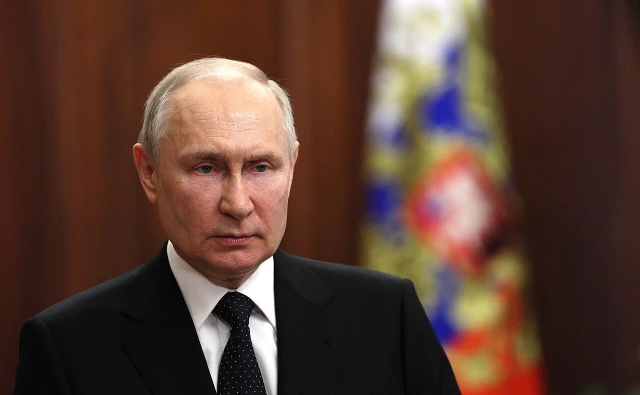Russian President Vladimir Putin threatened that if the US and UK agreed to loosen restrictions on long-range strikes into Russia, it would be seen as an act of aggression signifying the North Atlantic Treaty Organization’s (NATO) countries were “at war.”
Russia has consistently attacked Ukraine with thousands of rockets and drones since its invasion in February 2022.
The North Atlantic Treaty Organization’s (NATO) has been reluctant to provide weapons that Kyiv had asked for before Russia’s full-scale invasion because of fears that tensions with Russia would escalate.
Now, this could be changing, and NATO may supply Ukraine with such weaponry.
Moscow threatened to reduce Kyiv to a “giant melted spot” if Ukraine is allowed by its allies to use Western long-range missiles to strike targets deep inside Russia.
The threat by Dmitry Medvedev, deputy chairman of Russia’s Security Council, came as the U.S. and the U.K. are deliberating giving Kyiv permission to use Western weapons to attack strategic targets farther into Russian territory.
Medvedev threatened to use nuclear weaponry. But China and India have warned Russia against doing so.
Now, Russia is threatening to use newer technologies to create a “giant melted spot” on the site of Kyiv, Ukraine’s capital.
NATO could have done more to arm Ukraine to try to prevent Russia’s invasion in 2022, the outgoing head of the Western military alliance said in an interview released on Saturday.
“Now we provide military stuff to a war – then we could have provided military stuff to prevent the war,” NATO Secretary General Jens Stoltenberg told German weekly newspaper FAS.
When the war began, Kyiv, which is not a member of NATO, received several weapons systems from its allies after initial hesitation.
Stoltenberg, a former prime minister of Norway, will step down in October from his role at NATO, which he has held since 2014. Dutch former Prime Minister Mark Rutte was announced in June as the organization’s next boss.
In the interview, Stoltenberg said an end to the war in Ukraine would be achieved only at the negotiating table.
“To end this war there will have to be again dialogue with Russia at a certain stage. But it has to be based on Ukrainian strength,” he said.
David Petraeus, the former CIA director, said Vladimir Putin is bluffing over his red line on long-range missiles and that there’s nothing more “conventionally that he can actually do that he’s not already doing.”
Petraeus, speaking to the BBC, said the potential lifting of restrictions over the use of long-range weapons inside Russia was “long overdue” and “it’s never too little too late”.
He said he believed theRussian president was bluffing, adding that the Russian leader “has established innumerable red lines before. The Ukrainians and/or western countries have crossed just about all of them.
“We are now in the third year of a full-scale war. After so much death, destruction and countless Russian war crimes, Putin can still afford to destroy life in Ukraine as he pleases, buy and produce missiles, bombs and artillery, and issue ultimatums to the world,” Volodymyr Zelenskiy, the Ukrainian leader,said in a post on X on Friday before the meeting. “He expects the world to fall for his madness.”
In a significant statement reflecting the evolving discourse within NATO, Admiral Rob Bauer, head of the alliance’s military committee, asserted that Ukraine possesses both the legal and military right to conduct strikes deep within Russian territory to secure a strategic combat advantage. This position, which mirrors the views of several key U.S. allies, underscores the belief that Ukraine’s right to self-defense does not end at its borders—a sentiment gaining traction across NATO, even as the Biden administration hesitates to provide Kyiv with the American-made long-range weapons necessary for such strikes.
Speaking at the conclusion of NATO’s annual military committee meeting, Admiral Bauer emphasized that the principle of self-defense is internationally recognized and should be applied to the Ukrainian conflict.
“Every nation that is attacked has the right to defend itself, and that right doesn’t stop at the border of your own nation,” Bauer, a seasoned military strategist from the Netherlands, remarked, underscoring a broader interpretation of international law amid the ongoing war in Eastern Europe.
However, Bauer also acknowledged the sovereignty of nations in determining the parameters for arms provisions, particularly in the context of the Ukraine war. The Netherlands, like several NATO members, has maintained limits on the use of their weapons systems, although Bauer’s comments hinted at the growing complexity of these decisions as the war drags on.
In contrast, Czech General Karel Řehka made it clear that his country places no such restrictions on how Ukraine uses the military equipment provided. “We believe that the Ukrainians should decide themselves how to use it,” said Řehka, further illustrating the divide within the alliance on how far military support to Ukraine should go.
These statements come at a pivotal moment as U.S. President Joe Biden faces mounting pressure to expand Ukraine’s military capabilities by authorizing the use of American-supplied long-range systems for strikes inside Russian territory. The reluctance of the U.S. to permit such actions, for fear of escalating the conflict, contrasts sharply with the position of certain European allies who believe these strikes are necessary for Ukraine to regain momentum in the war.
The divergent views within NATO reveal an underlying tension between a cautious U.S. administration and European allies more willing to push the boundaries of conventional military support for Ukraine. While some nations, including the Czech Republic, advocate for an unfettered Ukrainian ability to strike where they see fit, others remain more conservative in their approach, wary of triggering a broader confrontation with Russia. This split reflects broader strategic debates about the future of the conflict and the acceptable limits of Western involvement.
